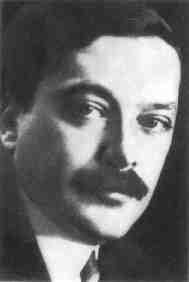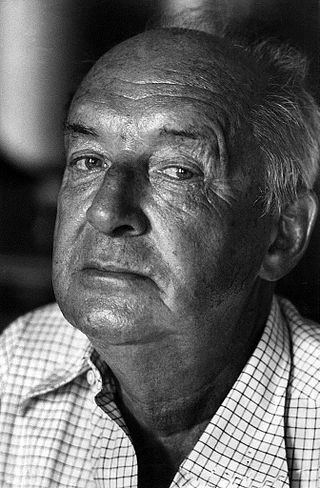
Vladimir Vladimirovich Nabokov, also known by the pen name Vladimir Sirin, was a Russian and American novelist, poet, translator, and entomologist. Born in Imperial Russia in 1899, Nabokov wrote his first nine novels in Russian (1926–1938) while living in Berlin, where he met his wife, Véra Nabokov. He achieved international acclaim and prominence after moving to the United States, where he began writing in English. Nabokov became an American citizen in 1945 and lived mostly on the East Coast before returning to Europe in 1961, where he settled in Montreux, Switzerland.

Russian literature refers to the literature of Russia, its émigrés, and to Russian-language literature. Major contributors to Russian literature, as well as English for instance, are authors of different ethnic origins, including bilingual writers, such as Kyrgyz novelist Chinghiz Aitmatov. At the same time, Russian-language literature does not include works by authors from the Russian Federation who write exclusively or primarily in the native languages of the indigenous non-Russian ethnic groups in Russia, thus the famous Dagestani poet Rasul Gamzatov is omitted.

Ivan Alekseyevich Bunin was the first Russian writer awarded the Nobel Prize in Literature, in 1933. He was noted for the strict artistry with which he carried on the classical Russian traditions in the writing of prose and poetry. The texture of his poems and stories, sometimes referred to as "Bunin brocade", is considered to be one of the richest in the language.

The Gift is Vladimir Nabokov's final Russian novel, and is considered to be his farewell to the world he was leaving behind. Nabokov wrote it between 1935 and 1937 while living in Berlin, and it was published in serial form under his pen name, Vladimir Sirin.

Vasily Andreyevich Zhukovsky was the foremost Russian poet of the 1810s and a leading figure in Russian literature in the first half of the 19th century. He held a high position at the Romanov court as tutor to the Grand Duchess Alexandra Feodorovna and later to her son, the future tsar Alexander II.
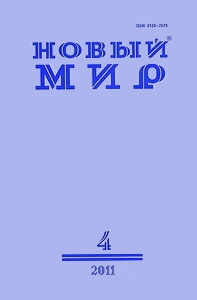
Novy Mir is a Russian-language monthly literary magazine.
M. Ageyev was the pen name of the writer of the Russian Novel with Cocaine. He is believed to be Mark Lazarevich Levi.

Maxim D. Shrayer is a bilingual Russian-American author, translator, and literary scholar, and a professor of Russian, English, and Jewish Studies at Boston College.
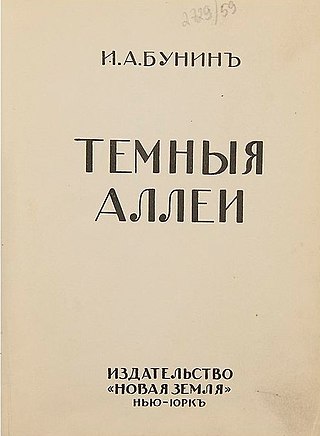
Dark Avenues is a collection of short stories by Nobel Prize-winning Russian author Ivan Bunin. Written in 1937–1944, mostly in Grasse, France, the first eleven stories were published in New York City, United States, in 1943. The book's full version came out in 1946 in Paris. Dark Alleys, "the only book in the history of Russian literature devoted entirely to the concept of love," is regarded in Russia as Bunin's masterpiece. These stories are characterised by dark, erotic liaisons and love affairs that are, according to James B. Woodward, marked by a contradiction that emerges from the interaction of a love that is enamoured in sensory experiences and physicality, with a love that is a supreme, if ephemeral, "dissolution of the self."

The Village is a short novel by the Nobel Prize-winning Russian author Ivan Bunin, written in 1909 and first published in 1910 by the Saint Petersburg magazine Sovremenny Mir under the title Novelet (Повесть). The Village caused much controversy at the time, though it was highly praised by Maxim Gorky, among others, and is now generally regarded as Bunin's first masterpiece. Composed of brief episodes set in its author's birthplace at the time of the 1905 Revolution, it tells the story of two peasant brothers, one a brute drunk, the other a gentler, more sympathetic character. Bunin's realistic portrayal of the country life jarred with the idealized picture of "unspoiled" peasants which was common for the mainstream Russian literature, and featured the characters deemed 'offensive' by many, which were "so far below the average in terms of intelligence as to be scarcely human."
Dry Valley is a short novel by a Nobel Prize-winning Russian author Ivan Bunin, first published in the April 1912 issue of the Saint Petersburg Vestnik Evropy magazine. Having come out soon after The Village (1910), it is usually linked to the latter as the author's second major book concerning the bleak state of Russia as a whole and its rural community in particular. It is also regarded as the last in Bunin's early 1900s cycle of "gentry elegies". The novel was filmed in 2011, directed by Aleksandra Strelyanaya.
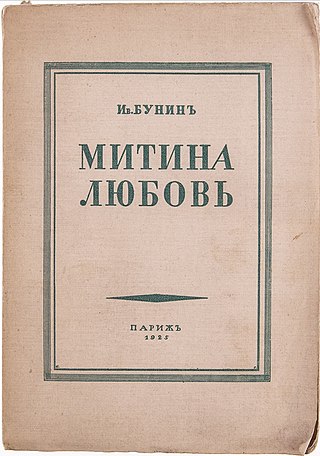
Mitya's Love is a short novel by the Nobel Prize-winning Russian author Ivan Bunin written in 1924 and first published in books XXIII and XXIV of the Sovremennye zapiski, a Paris-based literary journal in 1925. It also featured in a compilation of novelets and short stories published the same year in France.
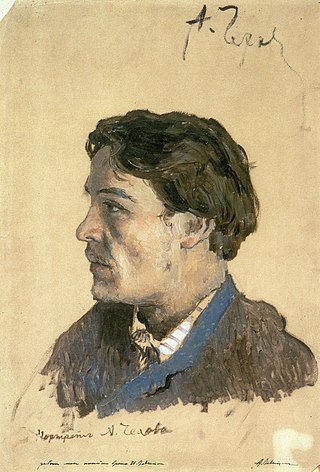
About Chekhov is a book of memoirs by Nobel Prize-winning Russian author Ivan Bunin, devoted to Anton Chekhov, his friend and major influence. Bunin started working on the book in the late 1940s in France. It remained unfinished, and was completed by the writer's widow Vera Muromtseva, and came out posthumously in New York City, in 1955. Translated by Thomas Gaiton Marullo, the book was published in English in 2007, under the title About Chekhov. The Unfinished Symphony.
Mark Sergeyevich Kharitonov was a Russian novelist, poet, essayist, and translator. He was awarded the first Russian Booker Prize in 1992 for his novel Lines of Fate.

Sovremennye zapiski was a politicized literary journal published from 1920 to 1940. A group of adherents of the Russian Socialist-Revolutionary Party launched the journal during the Russian Civil War.
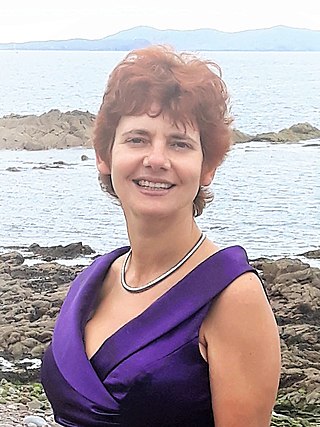
Margarita Maratovna Meklina is a short story writer and novelist.
Mark Lvovich Slonim was a Russian politician, literary critic, scholar and translator. He was a lifelong member of the Socialist Revolutionary Party, and, in 1917, served as its deputy for Bessarabia in the Russian Constituent Assembly. He joined the Samara Government during the early phases of the Civil War, opposing both the Bolsheviks and the conservative elements of the White movement. Assigned to his party's Foreign Delegation, Slonim lobbied unsuccessfully for the return of Bessarabia to Russia during the Paris Peace Conference. After a short stay in Tuscany, he settled in Czechoslovakia in 1922, an editor of Volya Rossii review.
Andrei Volos is a Russian writer.

Roman Davidovich Timenchik is a Soviet and Israeli literary critic and a researcher on Russian literature of the 20th century.

Don Aminado (1888–1957) was a Russian emigre writer. He was born Aminodav Shpolyansky into a Jewish family in Elizavetgrad in the Kherson Governorate of the old Russian empire. He studied law in Odessa and Kiev, and showed literary promise during his student years. In the decade of the 1910s, he published in various outlets such as Rannee Utro, Novy Satirikon and Krasnyi Smekh, dropping his Jewish name in favour of the pen name Don Aminado.
